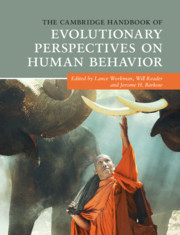Book contents
- The Cambridge Handbook of Evolutionary Perspectives on Human Behavior
- The Cambridge Handbook of Evolutionary Perspectives on Human Behavior
- Copyright page
- Dedication
- Contents
- Figures
- Tables
- Contributors
- Preface
- Acknowledgments
- Part I The Comparative Approach
- Part II Sociocultural Anthropology and Evolution
- Part III Evolution and Neuroscience
- 7 Are Evolutionary Psychology and the Neuroscience of Motivation Compatible?
- 8 Are We Designed to Be Happy?
- 9 Environmental Pressures on Transgenerational Epigenetic Inheritance
- Part IV Group Living
- Part V Evolution and Cognition
- Part VI Evolution and Development
- Part VII Sexual Selection and Human Sex Differences
- Part VIII Abnormal Behavior and Evolutionary Psychopathology
- Part IX Applying Evolutionary Principles
- Part X Evolution and the Media
- Index
- References
8 - Are We Designed to Be Happy?
The Neuroscience of Making Sense of Pleasure
from Part III - Evolution and Neuroscience
Published online by Cambridge University Press: 02 March 2020
- The Cambridge Handbook of Evolutionary Perspectives on Human Behavior
- The Cambridge Handbook of Evolutionary Perspectives on Human Behavior
- Copyright page
- Dedication
- Contents
- Figures
- Tables
- Contributors
- Preface
- Acknowledgments
- Part I The Comparative Approach
- Part II Sociocultural Anthropology and Evolution
- Part III Evolution and Neuroscience
- 7 Are Evolutionary Psychology and the Neuroscience of Motivation Compatible?
- 8 Are We Designed to Be Happy?
- 9 Environmental Pressures on Transgenerational Epigenetic Inheritance
- Part IV Group Living
- Part V Evolution and Cognition
- Part VI Evolution and Development
- Part VII Sexual Selection and Human Sex Differences
- Part VIII Abnormal Behavior and Evolutionary Psychopathology
- Part IX Applying Evolutionary Principles
- Part X Evolution and the Media
- Index
- References
Summary
The science of happiness is still in its infancy; there is little consensus on how happiness might be best defined, let alone studied. Still, the pursuit of happiness was inscribed in the American Constitution as a fundamental right, and recently governments around the world have started to measure the happiness and well-being of people as a measure on par with gross national product.
Whatever it is, happiness is clearly desirable, yet worryingly fleeting. In this chapter, we will describe some of the scientific progress that has been made. We will take our lead from Aristotle, who was interested in the good life; a life lived embedded in meaningful values (Aristotle, 350 BC/1976). He divided the main ingredients into hedonia and eudaimonia. The former is perhaps best translated as “pleasure” (derived from hedus, the sweet taste of honey), while eudaimonia is often translated as “well-being,” although it is probably better captured by “flourishing” or “meaningful pleasure.”.
- Type
- Chapter
- Information
- Publisher: Cambridge University PressPrint publication year: 2020
References
- 1
- Cited by

